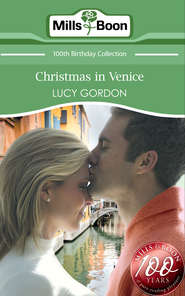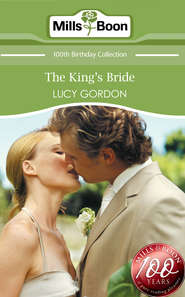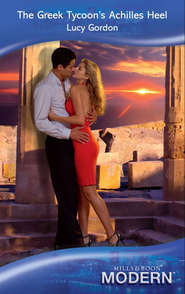По всем вопросам обращайтесь на: info@litportal.ru
(©) 2003-2024.
✖
Husband By Necessity
Автор
Год написания книги
2018
Настройки чтения
Размер шрифта
Высота строк
Поля
A stern sense of propriety made him try to ignore the thought—after all, she was a guest in the house. But there was no ignoring the impish way she looked up at him, or the way his own body was responding to the thought of her nakedness.
‘This is all wrong, you know,’ she called.
‘What’s all wrong?’ he asked, suspicious at not understanding her.
‘It’s Juliet who’s supposed to stand on the balcony, and Romeo who looks up from below.’
Her voice carried sweetly on the night air, like the singing of nightingales, and he could only look at her dumbly.
‘Aren’t you going to say anything?’ she asked, her head on one side, like a pretty, expectant little bird.
‘Yes—I was going to ask if you rose to see the dawn. It will be very soon.’
‘I expect it’s lovely.’
‘It’s lovely here, but even more so in my home, because it is so high.’ He took a deep breath and forced himself to say, ‘I’m glad to see you now, because I have to leave very early tomorrow, to return there.’
‘Oh.’ That was all she said, but the disappointed droop in her voice was more than he could bear. The next words came out despite his determination that they shouldn’t. ‘Perhaps you would care to come with me.’
‘I’d love to.’
‘We leave very early.’
‘No way!’ she almost squeaked, trying to remember the sleepers in the house and express her outrage at the same time. ‘I get up early when I go to work. I’m on holiday.’ She almost danced with indignation.
He grinned, enchanted by her. ‘I’ll wait for you. Now be off back to bed, or you’ll oversleep.’
She laughed and vanished. Bernardo stayed a long time looking at the place where she’d been. He knew he’d done something dangerous to his peace. If he was wise he would write her an apologetic note, leave it with a servant, and depart at once.
But he wasn’t going to. Because suddenly he didn’t want to be wise.
Next morning was a bustle of departure. Lorenzo was off to Stockholm to finish some work before the wedding. Renato was taking Heather sailing so that she could decide whether to accept the offer of his yacht for the honeymoon. Angie politely declined the offer to accompany them, explaining that she was going to the mountains with Bernardo.
‘You be careful,’ Heather warned.
Angie smiled, thinking of last night, and the way the silver moonlight had limned Bernardo’s chest and the muscles of his shoulders and arms. ‘Where’s the fun in being careful?’ she murmured to herself, as she got into the shower.
She chose her clothes thoughtfully. White jeans, with a deep blue silk top that turned her eyes to violet. It was slightly stretchy, and clung in a way that showed what a nice shape she had. Dainty silver sandals and a silver filigree necklace and matching earrings completed her appearance, and a discreet squirt of a very expensive perfume provided the finishing touch.
She was prompt, but even so he was waiting for her beside his car, a four-wheel drive, made for rough terrain. It was like the man, nothing fancy, but powerful, uncompromising, made to last.
He swung out of Palermo and into the countryside. After a while they began to climb, and before long they’d reached a small village with narrow, twisting streets. At the top of a hill stood a pretty pink villa with two curved staircases on the outside.
‘This village is Ellona,’ Bernardo told her. ‘It mostly belongs to Baptista. So does the villa. We used to live there in the summer. In fact, that was where—’ He braked suddenly as a chicken darted across the road and uttered something in Sicilian that sounded like a curse.
‘What did that mean?’ Angie asked.
He coloured. ‘Never mind. I shouldn’t have said it.’
‘Go on with what you were saying. That was where—?’
‘I forget. Look at the scenery just up here. It’s magnificent.’
It wasn’t just her imagination, she thought. After the first slip of the tongue he’d retreated back in on himself and, when she tried to follow, he’d warned her off. She wasn’t foolish enough to persist.
Away from the fertile coast the landscape of Sicily changed, become harsher, more barren.
‘All the prosperity is on the coast,’ Bernardo said. ‘In-land we live as we can. There are crops, sheep, goats. Sometimes we do well, but it’s a precarious existence.’
‘We?’ she asked.
‘My people,’ he said simply. ‘The ones who depend on me.’
After a while he asked, ‘Does the height worry you? Some people get scared as the road twists and turns.’
‘Not me,’ she said bravely, although her eyes were getting a little glazed. ‘How high are we now?’
‘Nearly half a mile above sea level.’
Higher and higher they went on the winding mountain road, while the glory of Sicily fell away beneath them. Everywhere Angie looked there were acacia and lemon blossom, and far distant she could make out the gleam of the sea.
The scenery grew fiercer, grander. They were passing through pinewoods, then the woods were behind them and an upland plain spread out, with vineyards and, above them, a steep cliff with farmhouses.
‘The farmers abandoned them long ago,’ Bernardo said. ‘This is a harsh place to live in winter.’
After a few more miles he pointed and said, ‘Look.’
She rose in her seat, gasping in amazement and delight at the sight that met her eyes. Ahead of them was a village that seemed to have been carved direct from the very rock that reared up to a windswept promontory. What might have been a bleak and uncompromising scene was softened to beauty by the reddish colour of the sheer rock face. She sat back, gazing in wonder as they drove closer, and she saw that this was actually an enchanting little medieval town, whose delights had to be seen up close to be appreciated.
‘That’s Montedoro,’ Bernardo said. ‘Most of it is seven hundred years old.’
They drove in through an ancient gateway and immediately began to climb a steep, beautifully cobbled street, the Corso Garibaldi, according to the signs. It was lined with shops, many of which seemed to sell sweets and pastries. Faces watched them curiously, and it was clear that everyone knew who Bernardo was. She wondered about the size of the village. From the outside it hadn’t seemed very big.
He drove very slowly, for the streets were crowded with tourists. At one point a cart turned out of a street directly in front of them, forcing them to slow to a walk. It contained five people and was drawn by two mules sporting tassels and feathers. But what really drew Angie’s attention was the fact that the cart was brightly decorated in every possible place.
‘Is that one of the Sicilian hand-painted carts I’ve heard about?’ she asked eagerly.
‘That’s right. My friend Benito and his son make a summer living giving rides in their carts.’
Travelling so slowly, she had time to study the glorious paintwork. The wheels, including the spokes were covered in patterns, while on the main body were pictures of saints, warriors and dragons, all glowing in the brilliant sun.
At the top of the street he swung right along a pretty street of grey stone houses, all with ironwork balconies, and at the end of that he swung right again, heading downwards to a building that Angie gradually recognised as the gate where they’d entered.
‘But—that’s—’
‘Montedoro is a perfect triangle,’ he said with a grin. ‘Now we’ll go up the Corso Garibaldi again, to my house.’
When they reached the top she saw a small piazza with several boutiques, and a café with tables spilling onto the street, each one sheltered by a brightly coloured awning. He parked the car and headed for one of the shops, so it seemed to Angie, but at the last minute he swerved aside, to a lane so narrow that she hadn’t seen it. It went right to the back of the shop where it crossed with another lane. Here the space was so cramped and the houses so tall that it was almost dark. When Angie’s eyes were used to the gloom she saw a narrow door in the wall.











